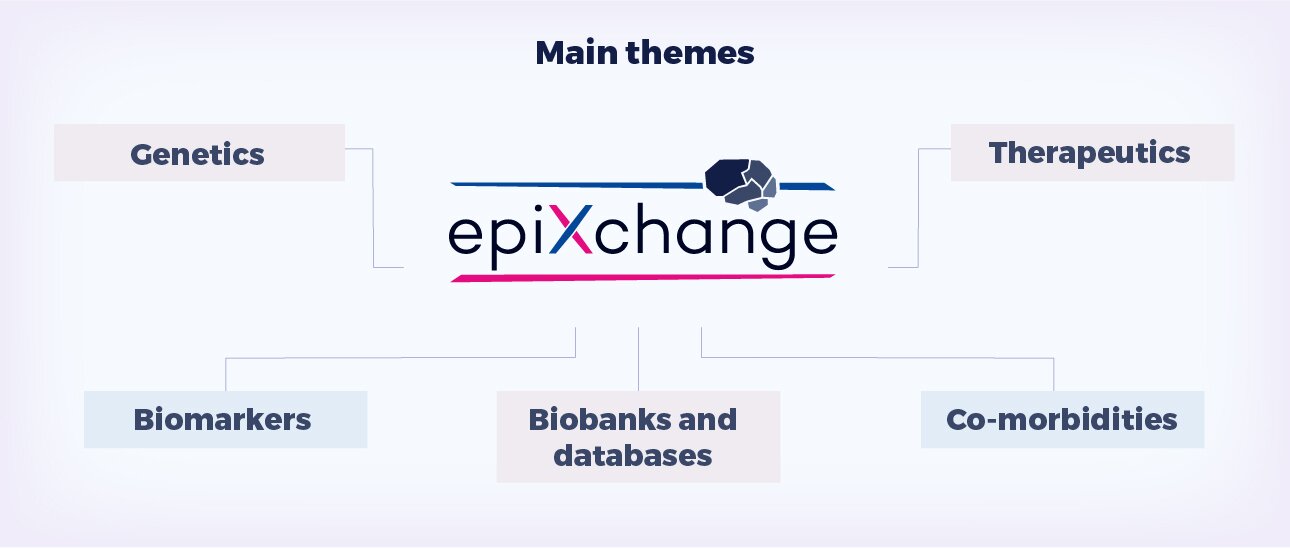
epiXchange Conference
23 May 2018, Brussels
A community building event
for epilepsy research

epiXchange brings together the excellence of epilepsy research in Europe for a conference in Brussels on 23 May 2018. The main goal is to showcase major findings from seven large European epilepsy research projects, discuss the main bottlenecks and recommendations to move forward and to bring research results closer to clinical application.
In connection to the scientific conference, the European Commission together with epiXchange partners organise a workshop on 24 May.
Organisers
Seven large EC-funded projects on epilepsy co-organise this conference to disseminate project results and discuss the future of epilepsy research in the EU and worldwide.
Four of the projects (DESIRE, EpimiRNA, EPISTOP and EPITARGET), still ongoing FP7 collaborative research projects, are co-financing the event. Scientific contributions are provided by partners from EpiCare, an ongoing reference network project, as well as EpiPGX (FP7 collaborative research project) and Epixchange (FP7 MSCA ITN project), which are now finished.
Main themes

These research projects aim to understand the various causes of epilepsy, enable complex diagnostics and suggest new ways of treatment. Therefore, the epiXchange conference focuses on following main themes:
Genetics
State of the art and beyond state of the art exploring and developing novel treatment strategies based on optogenetics, gene and stem cell therapies.
Therapeutics
Although over 20 antiepileptic drugs are on the market, seizures in over 30% of patients still remain refractory to treatment and 30% of patients on treatment experience quality-of-life compromising adverse events. Better and more efficient treatments are therefore needed.
Biomarkers
Identification of new biomarkers in blood, peripheral organs, brain tissue, electrophysical data, behavioural data and imaging data, in order to develop novel preventive strategies in at-risk patients.
Biobanks and databases
Integration of Biobanks and databases into clinical care to facilitate preclinical research. A collaborative approach as foundation for the future of epilepsy research and other disease model biobanks.
Co-morbidities
Exploration of the mechanisms underlying bi-directional relations between epilepsy and neurological co-morbidities to reduce the high burden of co-morbidities in epilepsy.

In connection to the scientific conference, the European Commission together with epiXchange partners organise a workshop - 'Translating Research into Action - Shaping the Future of the Epilepsy Research' on 24 May to discuss main achievements, challenges, priorities in epilepsy research and to establish recommendations for a long-term strategy with a global approach.
Research with a global approach.
Both European and global authorities will be represented as well as regulatory bodies, patients associations, and representatives from other research initiatives. The aim will be to identify gaps and needs, impact enhancement of results, such as pathways (including regulatory) to clinical guidelines, product development and policy recommendations.
Due to limited capacity of the venue, participation in this event is by invitation-only. If you are interested in this workshop, please send an email to .
Poster session
Registered participants can submit an abstract to participate in the poster session. For more information, click here:
Poster SessionRegistration
The deadline for registration was 24 April 2018.

